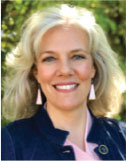BY , RD, LDN
The urge for a plant to grow is so strong that its shoots will creatively change course, wiggling around rocks and roots to its full expression. How does the plant know how to receive nourishment and move through the phases of growth to its fullest expression of itself? Instinct.
In fact, the instinct of plants to root down into the earth as the shoot moves toward the light is embedded in its DNA. A recent NASA experiment sent seeds into space to determine the effect of gravity on growth. The study revealed that plants maintain their earth-growing instincts even without the effect of gravity (http://news.nationalgeographic.com/news/2012/121207-plants-grow-space-station-science/#close-modal).
As a nutrition counselor, one of the most common food-related challenges affecting how people feel about themselves as eaters is what I would term “the overfed head syndrome”—the overconsumption of nutrition and diet-related information. It seems we have lost a connection with our own instincts.
There is a fine balance between taking in information that can inform and empower someone to make positive life changes versus following the latest diet recommendations as a solution to a present perceived problem or goal.
On any given day, we hear about new studies: Is coffee good or bad? What is the best fat? Should I avoid soy and corn if it is genetically engineered? A toxin detox is the way to go. Eat like your ancestors—try paleo. Honor the environment—go vegetarian. It’s not the information that is the concern; it is HOW we consume this information.
This information overconsumption is leading to a subtle nutrition-related crisis of complete confusion, insecurity, guilt and shame. The balance of the mind and the body relationship is compromised. We lose the ability to remain open, flexible to our present moment, to receive and translate the signals from our instinctual bodies—responding skillfully moment to moment as life unfolds.
This can lead to a disconnected eating style that is motivated by impulse, judgment and stress, including emotional overeating, feeling insecure eating in public and guilty or justified as we are consuming a delicious cookie.
So how do we connect with our body instincts? Is it possible to reprogram the internal addiction to dietary perfection or impulsive poor eating choices?
Mind-body medicine and ancient wisdom systems are proving the amazing capacity we have to heal and transform ourselves through compassionate self-care practices such as mindfulness, meditation, regular joyful movement and journaling.
Once we can quiet the mind and de-escalate the stress response, we open to the subtler instinctual language of our Wise Self.
Developing a relationship with the body as your most valued, trusted friend will increase trust in yourself, other people, the world and yes, FOOD. Your food choices become a dynamic process of responding in the moment to hunger, health, energy, community and the environment. Your digestive capacity increases for all life experiences because you trust in the wisdom of your body to know exactly what to do with what it is fed.
There is also trust that the body will give you feedback about what is not nourishing, and if you are listening closely enough, you can step into your power to choose differently instead of seeking the answer in a book.
So, no secret—the balance we seek is modeled for us in nature. Send gratitude to the plants and animals for reminding us about our true nature—we must also grow deep roots to have the stability to trust, breathe into the moment and learn the language from our own body and heart.
We are meant to live full, bright, joyful lives—even if we are not perfect eaters.





